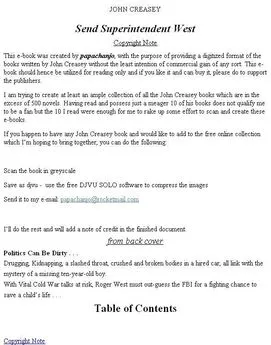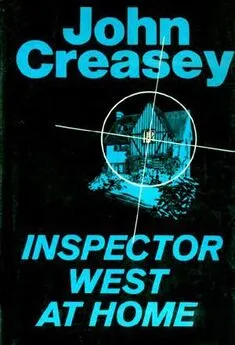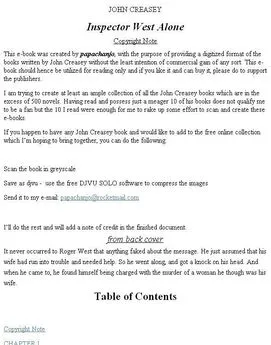John Creasey - Send Superintendent West
- Название:Send Superintendent West
- Автор:
- Жанр:
- Издательство:неизвестно
- Год:неизвестен
- ISBN:нет данных
- Рейтинг:
- Избранное:Добавить в избранное
-
Отзывы:
-
Ваша оценка:
John Creasey - Send Superintendent West краткое содержание
Send Superintendent West - читать онлайн бесплатно полную версию (весь текст целиком)
Интервал:
Закладка:
Ed turned his head and stared out of the back window. As they turned a corner, he moved round slowly, moistening his lips.
“You see him?”
“We’re not blind,” Jay said.
“A cop.”
“We don’t have to worry about English cops,” Jay said. He sounded as if he were trying to convince himself.
“We don’t have to worry about anything,” Mac stated flatly.
“Even in this goddamned country it isn’t a crime to drive by night, although maybe you’d think it was, they go to bed so early. Ed” — he maintained the steady monotone — “you’ve got work to do. It should be easy, you have kids of your own. Open that case — give him the case, Jay — and get the kid dressed. We still have an hour. Take it easy. Don’t forget his underpants.” Mac sounded as if that was meant for a joke. “You want to close the door?”
Ed took another glance out of the back window, slammed the door, then began to dress the kidnapped child.
2
ASSIGNMENT
ROGER West lay in bed, eyes closed, breathing heavily, giving a fair imitation of a snore. He heard the door open, and stealthy movements inside the room. He didn’t open his eyes. Rustling sounds followed, and he knew he wouldn’t need to keep up the pretence much longer. Cups chinked as a tray was put on the small table next to the bed on his side, and he opened his eyes and looked through his lashes at the broad face of Martin-called-Scoopy, his elder son, beaming down at him.
“ ‘Morning, Pop!”
“I’ll pop you,” Roger said, gruffly. He struggled up to a sitting position as Richard, his younger son, half a head taller than Martin, entered the bedroom. Both boys had the glow of health in cheeks and eyes, and in that moment something in their expressions made them remarkably alike, although usually they were so different. Your mother’s all right or you wouldn’t be looking so pleased with yourselves. You want something, or you wouldn’t both be here. No.”
He began to pour out tea.
At twenty-one, Martin was more than old enough to know his own mind, and he was studying art at the Chelsea College of Painting, working in the evenings and weekends. Richard was working at a film studio near London, hoping to write scripts for a living. It was seldom that either came to him for anything, these days; for them both to come at once was rare indeed.
“If it’s no,” Richard said, “you’re in for a shock, Dad.”
Roger sipped his tea.
“Well, one of us is,” he temporized. There was something in their minds he couldn’t guess. It wasn’t April Fool’s Day. It wasn’t his birthday. It wasn’t —
Suddenly, he remembered; it was the first day of the Summer Sales, and Janet had said she wanted to go to Oxford Street. She was desperate for a new Autumn outfit; he must have slept on — but no, it wasn’t too late — just before eight.
“All right,” he said. “Shock me.”
“Mum forgot to get any money out of the bank,” Richard said, “and you’ve only a pound in your wallet. So she’s gone to get a place in the queue at Debb’s, and somehow you have to take her some money.”
“Twenty-four years wed, she complained,” said Scoop, “and she still doesn’t know where you keep your secret hoard. She turned the place upside down.”
“I still keep it at the bank, and she knows it,” Roger said. “I’ll have to change a cheque at a shop on the way.”
It was an empty kind of morning, without Janet; emptier as soon as the boys had left. Boys? And Richard a bare year younger than Martin? He laughed the thought away as he went downstairs to get his own breakfast; but there was instant porridge, bacon and eggs in the frying pan, everything ready for him.
He caught Janet a few yards from the main entrance at Debb’s, one of several hundred women; and once he had put thirty pounds into her hands there was a surge forward as the door opened.
“See you!” Roger called.
“Thank you, darling,” she said breathlessly, and was carried with the crowd, dark-haired, neat in a plain grey suit, young for her forty-odd years, and at that moment, not thinking of him at all.
Roger got back into the car, restarted the engine, and was soon caught up in the stream of early morning traffic. There had been a time when he had arrived at Scotland Yard morning after morning with a sense of excitement and expectation, but now he knew what to expect. Crime had a thousand variations, and he seemed to know them all. For a Detective Superintendent, murder cases had lost their stimulating effect. The paperwork and routine of a senior Criminal Investigation Department officer kept him at the desk more and more, and there were times when the pleasant office was like a jail; or like a cell at the squat grey building of Cannon Row Police Station, which looked as if it were in a corner of the Yard premises, but in fact was not. All the small windows were barred. Big Ben could look down on its slate roof from the tower of the Houses of Parliament, but couldn’t make the drab grey look bright even on this fine warm summer morning.
Roger parked his car and walked up the steps. Good morning, good morning, “morning, “lo, Handsome; such greetings had become a ritual. Calling him “Handsome” West had, too. So had sitting at his desk and looking through mail and reports. But today it depressed him. Glancing through the dossier of an old lag, due at Great Marlborough Street Court on a charge for the thirteenth time, Roger knew exactly what he would say, what the magistrate would say and what he would look like, peering over his spectacles; what lies the accused would utter, forlornly, what the magistrate’s clerk would intone, and what everything and everybody would be like. He lit a cigarette, yawned, scribbled a few pencilled notes, and the telephone bell rang.
“West speaking.”
“Good morning, sir.” It was a girl. “The American Embassy — I’m sorry, the United States Embassy — is on the line. They wanted the Assistant Commissioner or the Commander, but they’re not in, sir.”
“I’ll speak to the Embassy,” Roger said. At least this was different.
“Just a moment, please,” the girl said.
Almost at once a man with a clipped North American accent said: “Is that Superintendent West?”
“Yes, sir. Good morning.”
“Good morning. Mr West, we need your help here, and we need it very badly and very fast. I am Tony Marino, and I’ll wait in my office until you arrive. You’ll find an impatient and worried man, Mr West.”
Roger could have asked questions, and could have been formal. Instead, he said simply:
“I’ll be with you in fifteen minutes, Mr Marino.”
“I’m very grateful.” The American’s voice died in the click of the telephone.
Roger stood up, took his trilby from a wall-peg and hurried to the door. If he saw the Commander, CID or Hardy, the new Assistant Commissioner, he would have to report this, and he didn’t want to miss it He saw no one of superior rank, but as he reached the ground floor in the lift, Chief Inspector Bill Sloan, big, fresh-faced, boyish-looking, was waiting to step in.
“Just the man,” said Roger. “I’ve had a call from the American Embassy, they want someone in a hurry. It fell in my lap, and I’m keeping it Tell the Commander or the AC.”
Sloan grinned. “I’ll forget it long enough for you to get there.”
It took eighteen minutes to reach Grosvenor Square. In the bright morning sunshine, a dozen American tourists were busy with their cameras near the Roosevelt statue, big American cars, dwarfing the English ones, were parked nearby. He expected some formality, not the youthful-looking man waiting just inside the hall of the big new Embassy building which some people hated, and some thought was magnificent, who said:
“Superintendent West, isn’t it?”
“Yes.” Roger looked his surprise.
“I saw you in court one day, sir. I wasn’t the prisoner!”
Roger smiled, liking the clean-cut look of his guide. They went in a lift to the third floor, and walked along two passages before the man tapped on a wooden door which had no name on the outside. A voice said “come in”, but it wasn’t Marino’s; this was a small office, with another door leading off, standing ajar.
“Superintendent West,” said Roger’s guide.
“You certainly haven’t lost much time, sir.” The secretary, who might have been his guide’s twin brother, took over. We’ll go right in.”
The room beyond was large, carpeted, warmer than Roger liked. There were some portraits on the wall, including one in oils of George Washington, and a coloured photograph of Lyndon Johnson. Sitting directly beneath this was a heavily built man who seemed huge, his shoulders broad and powerful-looking, in a pale grey, light-weight jacket. He had a wide face and big but pleasant features, with dark hair cut short and standing upright; there was no pomade on it, and it gave him a kind of unfinished look. His square chin was cleanshaven, and he was obviously a man who needed to shave twice a day. His eyes were velvety brown in colour, and very clear. He smiled and put out a hand, but didn’t get up.
“Good of you to come in such a hurry, Superintendent. All right, Herb, I’ll ring if I want you.” Herb, the secretary, was pushing a chair up for Roger, and went out as Roger sat down. Marino slid a lacquered box of cigarettes across the desk. “American or English,” he said.
Roger felt that he was being photographed by those brown eyes; felt, too, as if he were being weighed on a mental balance. In a sudden flash, he realized how so many minor criminals felt when he sat weighing them up. He chose an English cigarette, and Marino flicked a lighter.
“Thanks. How can I help?”
“Well,” said Marino, “you could help several ways, I guess, but the best way would be to go out and find the boy. I’ve good reason to think that the ten-year-old son of David Shawn, who is on a special mission in the United Kingdom, was kidnapped last night, from a house on the Chiswick and Ealing borders. I don’t know why it happened, but we want the boy back because of what it means to his parents, and we also want him back because of what this might do to David Shawn, whose work is high on the Secrets List.”
Roger pondered, and asked: “Who knows about the kidnapping?”
“You and I, Lissa Meredith, who was acting as Shawn’s secretary, and Herb. In half an hour the Ambassador will also know. Lissa discovered what had happened. She had a key to the house, and was due at work at eight o’clock, but she arrived ten minutes late. She found everyone asleep, and couldn’t wake David or Belle Shawn, his wife. The child’s bed was empty, his clothes and a suitcase had been taken away. Lissa closed up the house, went to see the day maid, and told her not to go in. Then she telephoned me. I sent a man out to watch the house so that she could come here.”
“Why didn’t she send for a doctor?” Roger asked.
“She’s had some nursing experience, and decided the Shawns weren’t in danger.” Marino smiled; he had fine, very white teeth. “I’d like you to go to the house and see what you can make of the situation, Mr West. Can you do that without consulting anyone else?”
“I can but it would be wiser to have a word with the Commander or the Assistant Commissioner.”
Marino picked up a telephone, told Herb to get one or the other on the line, then put the instrument back.
“I know Ricky Shawn,” he said. “I would hate to have anything really bad happen to him. Have you any family?”
“Two boys,” Roger said.
Marino nodded, and they waited in silence while Roger tried to pierce the shroud of mystery which Marino had deliberately created. There were always difficulties about an investigation which had to be kept secret, especially in a kidnapping case.
Читать дальшеИнтервал:
Закладка:










